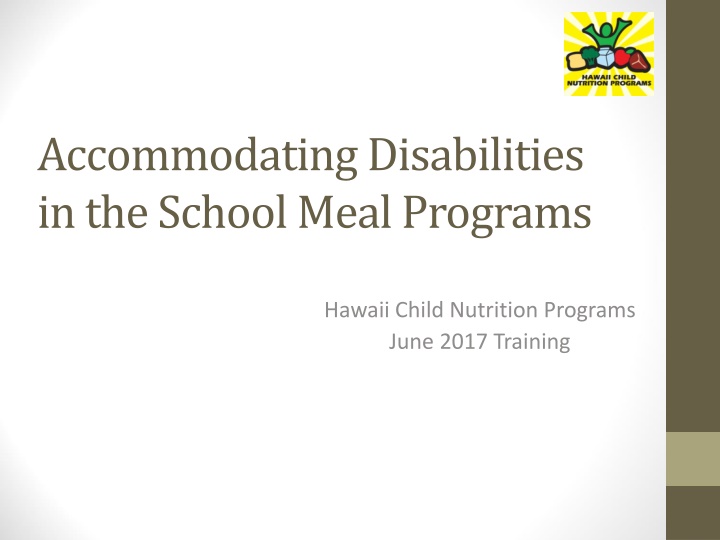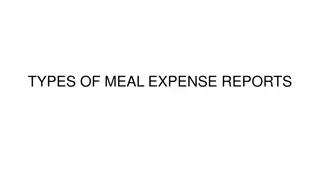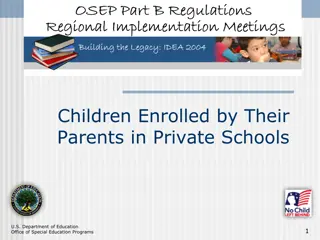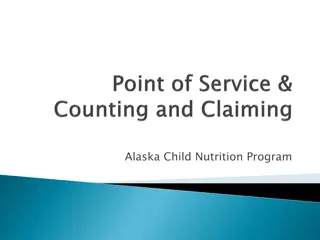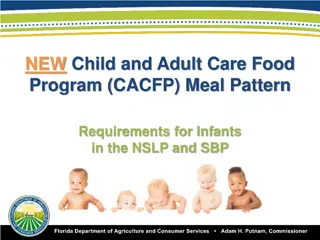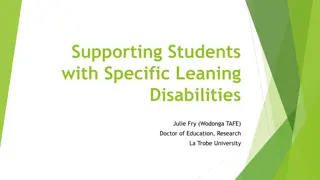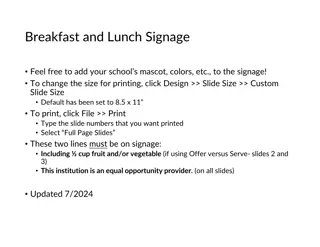Accommodating Disabilities in School Meal Programs
Learn about federal regulations requiring schools to provide accommodations for children with special dietary needs, responsibilities of school food services in compliance, and review of Special Diet Guidance. Explore laws and regulations such as the Rehabilitation Act of 1973, IDEA, ADA, and USDA nondiscrimination regulation. Understand what constitutes a disability and the importance of medical statements in providing necessary modifications in school meal programs.
Download Presentation

Please find below an Image/Link to download the presentation.
The content on the website is provided AS IS for your information and personal use only. It may not be sold, licensed, or shared on other websites without obtaining consent from the author.If you encounter any issues during the download, it is possible that the publisher has removed the file from their server.
You are allowed to download the files provided on this website for personal or commercial use, subject to the condition that they are used lawfully. All files are the property of their respective owners.
The content on the website is provided AS IS for your information and personal use only. It may not be sold, licensed, or shared on other websites without obtaining consent from the author.
E N D
Presentation Transcript
Accommodating Disabilities in the School Meal Programs Hawaii Child Nutrition Programs June 2017 Training
Objectives Learn the federal regulations which require schools to make reasonable accommodations for children with special dietary needs Describe the responsibilities of school food service in complying with these regulations Review the Special Diet Guidance as laid out in SP 26-2017
Laws and Regulations The Rehabilitation Act of 1973 Individuals with Disabilities Education Act (IDEA) Americans with Disabilities Act (ADA) USDA nondiscrimination regulation (7 CFR 15b) Memorandum SP 59-2016
What is considered a disability? Any person who has a physical or mental impairment which substantially limits one or more major life activities, has a record of such an impairment, or is regarded as having such an impairment. Section 504 of the Rehabilitation Act of 1973 Americans with Disabilities Act of 1990 Departmental Regulations at 7 CFR part 15b Major life activities include, but are not limited to: Caring for oneself, performing manual tasks, seeing, hearing, eating, sleeping, walking, speaking, breathing, reading, communicating Major life activities also include the operation of a major bodily function including, but not limited to Functions of the immune system, normal cell growth, digestive, bowel, bladder, neurological, brain, respiratory, circulatory, endocrine, reproductive functions
Medical Statement Program regulations require SFAs to provide modifications for children with disabilities on a case-by-case basis when requests are supported by a written statement from a State licensed healthcare professional, such as a physician or nurse practitioner. SFAs may choose to accommodate requests related to a disability that are not supported by a medical statement if the requested modification can be accomplished within the program meal pattern. Meals that do not meet the program meal pattern are not eligible for reimbursement, unless supported by a medical statement.
Medical Statement What should be included in the medical statement? Description of the child s physical or mental impairment that is sufficient to allow the SFA to understand how it restricts the child s diet Explanation of what must be done to accommodate the child; and The food or foods that must be omitted and recommended alternatives, if appropriate.
Who Can Sign the Statement? May accept statements signed by: Physicians Nurse Practitioners Physician Assistants Note: A Registered Dietitian Nutritionist (RD or RDN) may assist in implementing meal modifications, as appropriate, but the medical statement must be signed by one of the professionals listed above.
What if the statement is unclear? The SFA should follow the portion of the medical statement that is clear to the greatest extent possible. Immediately contact the child s parent or guardian for guidance until an updated medical statement can be obtained. If the statement is unclear and the parent does not know the proper modifications, request that the parent contact the physician for further instruction. All communication with the parent should be documented including the instruction provided from the parent until an updated medical statement is received.
Reasonable Modifications A reasonable modification is a change or alteration in policies, practices, and/or procedures to accommodate a disability that ensures children with disabilities have equal opportunity to participate in, or benefit from, a program. Special meals should be provided at no additional charge. Most disabilities can be managed within the program meal pattern requirements when a well-planned variety of nutritious food is available to children. If a child is allergic to pineapple, substitute with a different fruit. If modification requests include a brand name item, in most instances, a generic brand is sufficient, unless the brand name is medically necessary.
Reasonable Modifications Take every request at face value Make accommodations where you can. Reasonable is the key word May be different for each situation May not say this goes outside of our district s policy the disability law requires that you to make the necessary accommodations. For example: seating children with peanut allergies separately from other students. Some burden for the district is always expected
Reasonable Modifications When determining what is appropriate, the age and maturity of the child should factor into all decisions. Younger children may need greater assistance with selecting and eating their meals Older children may be able to take a greater level of responsibility for some of their dietary decisions. SFAs are not required to provide modifications that would fundamentally alter the nature of the program. SFAs concerned that a requested modification would alter the nature of the program should contact HCNP. The emphasis should be on working with parents and guardians to develop an approach that will be effective for the child.
Reasonable Modifications In certain situations, disability accommodations may require additional equipment; separate or designated storage/preparation areas, surfaces, or utensils; and specific staff training and/or expertise. For example: Some children may require the physical assistance of a food service aide to consume their meal, while other children may need assistance tracking their dietary intake (carbohydrates for children with diabetes)
Accessibility SFAs are responsible for the accessibility of food service areas and for ensuring the provision of food service aides, where needed, to assist in preparing and serving meal accommodations. No additional school meal program reimbursement is available for these types of accommodations. However, any additional costs for adaptive feeding equipment or for aides are considered allowable costs for the nonprofit school food service account.
Can the SFA decline a requested modification? It is almost never appropriate for an SFA to decline to provide an effective meal modification to accommodate a child s disability, if the modification request is related to the child s disabling condition. If an SFA declines a request, the SFA must ensure that the child s parent or guardian understands their rights under the Procedural Safeguards process.
Can OVS be used to accommodate a meal modification? NO Children with disabilities must have the opportunity to select all required food components for the meal. For example: A child who has Celiac Disease or a gluten intolerance must have a choice of a bread/grain items that is gluten free.
Accommodating modification requests for students who do not have a disability SFAs are not required to make meal modifications for children without a disability. Religious preferences, vegetarianism, low-carbohydrate diet If the SFA chooses to provide a modification for a child without a disability, the modification must be consistent with the meal pattern requirements for the meal to be considered reimbursable.
Reimbursement Modified meals are reimbursed based on the rate of the child s eligibility for free, reduced price, or paid meals, regardless of the modification. Meal modifications do not have to meet the program meal pattern requirements in order to be claimed for reimbursement if they are supported by a medical statement. However, SFAs should ensure that meal modifications meet the nutritional needs of the child.
Serving Meals in an Integrated Area SFAs must provide all meal services in the most integrated setting appropriate to the needs of the disabled child. Exclusion of any child from the program environment is not considered an appropriate or reasonable modification. It may be appropriate to require children with very severe food allergies to sit at a separate table to control exposure, however it is not appropriate to also use this table to segregate children as punishment for misconduct. Other children should be permitted to join the child with the food allergy, provided they do not bring any foods that would be harmful to the child.
Procedural Safeguards The Procedural Safeguards process requires SFAs/LEAs to provide notice and information to parents and guardians regarding how to request a reasonable modification and their procedural rights, which include the right to: File a grievance if they believe a violation has occurred regarding the request for a reasonable modification, Receive a prompt and equitable resolution of the grievance, Request and participate in an impartial hearing to resolve their grievance, Be represented by counsel at the hearing, Examine the record, and Receive notice of the final decision and a procedure for review, i.e., right to appeal the hearing s decision.
Procedural Safeguards SFA/LEA must designate at least one person to coordinate compliance with disability requirements. This position is often referred to as the Section 504 Coordinator. The 504 Coordinator who is responsible for addressing requests for accommodations in the classroom may also be responsible for ensuring compliance with disability requirements related to meals and the meal service. All food service staff should be aware of the procedures and know how to contact the Section 504 Coordinator. SFAs/LEAs are encouraged to develop a Section 504 Team to discuss best practices and develop a more holistic plan to create a safe learning environment for all children.
How often must the medical statement be updated? When SFAs receive updated medical information, they must ensure that the medical statement on file reflects the current dietary needs of the participating child. SFAs may require updates as necessary to meet their responsibilities, but should carefully consider the burden obtaining additional medical statements could create for parents and guardians when establishing such requirements.
Discontinuing a Modification It is not required to obtain a written document from a state licensed healthcare professional when rescinding the original medical order. However, it is highly recommended that the SFA maintain documentation when ending a meal accommodation. Ask the child s parent or guardian to sign a statement indicating their child no longer needs a meal accommodation before ending the accommodation. If it s not documented, it was not done.
Food Allergies An immune system response to a food that the body mistakenly believes is harmful Can range from relatively mild to severe (anaphylaxis) Common food allergies are peanuts, tree nuts, milk, eggs, soy, wheat, fish, and crustacean shellfish Meets the definition of disability, and the substitutions prescribed by the licensed physician must be made
Food Intolerances An adverse reaction to food that does not involve the immune system Not typically a disability as defined under Section 504 of the Rehabilitation Act or Part B of IDEA School food service may, but is not required to, make food substitutions for them Follow prescribed substitutions if made by the licensed physician
Diabetes Disorder in which the body is unable to produce or to respond to insulin. 2 forms of diabetes: Type 1 Type 2 Meets the definition of disability, and the substitutions prescribed by the licensed physician must be made
Other Special Dietary Needs Accommodations may be made for children with special medical or dietary needs, not considered disabilities School food service s discretion Case-by-case basis Examples: High cholesterol Lactose intolerance
Recapping Responsibilities Must make food substitutions or modifications for students with disabilities Substitutions and modifications must be based on medical statement provided by state licensed health care professional. Under NO circumstances are school food service staff to revise or change a diet prescription or medical order. Document, document, document Retain documentation on site. Documentation will be asked for during an Administrative Review. Ensure that the medical statement reflects the current dietary needs of the child. Request for the statement to be updated as needed. Know the Procedural Safeguards process and how to contact the 504 Coordinator
Situation #1 A licensed physician has prescribed portion sizes that exceed the maximum quantity requirements set forth in the regulations. Is the school required to provide these additional quantities?
Situation #2 A child s parents have requested that the school prepare a strict vegetarian diet for their child based on a statement from a health food store nutrition advisor who is not a licensed physician. Must the school comply with this request?
Situation #3 A child has a life threatening allergy which causes an anaphylactic reaction to peanuts. The slightest contact with peanuts could be fatal. To what lengths must the food service go to accommodate the child?
Situation #4 A school wishes to serve meals to children with disabilities in an area separate from the cafeteria where the majority of school children eat. May the school establish a separate facility for these children?
